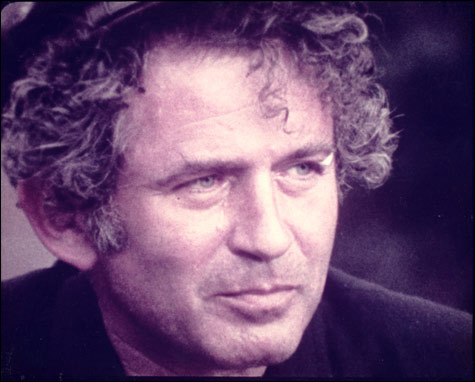
AMERICAN DREAM-ER: Norman Mailer made the shrewdest comments on contemporary America. |
In a discussion recorded for Canadian television in 1968, Norman Mailer found himself, not for the first time, riding to the defense of D.H. Lawrence. “Norman,” pleaded British journalist and fellow panelist Malcolm Muggeridge, “you’re not seriously saying that you think that Lady Chatterley’s Lover is a good novel, are you?” “I think it’s one of the five or 10 greatest bad novels ever written,” replied Mailer equably. “And that’s a category I’m particularly fond of, since it’s possible I’ve written a great many great bad novels myself.”
Humility — not a quality generally associated with Norman Mailer, who died this past Saturday at the age of 84. The obituaries were full of his machismo, his writerly egotism, his headbutting competitiveness. But try to imagine the above remark on the lips of, say, Don DeLillo. Or Paul Auster. Or Cormac McCarthy, for God’s sake. The average heavyweight American novelist, frowning diligently into the NPR microphone, would rather explode than confess to such an estimation of his own work.
Such, however, were the glories of Mailer: having strained with terrible intensity to be the best writer and the manliest man, he was always capable of making a philosophical end-run around his own bravado. Which was, let us not forget, immense. “I would go so far as to think it is my present and future work which will have the deepest influence of any work being done by an American novelist in these years,” he vowed grimly in 1959, adding, “I could be wrong, and if I am, then I’m the fool who will pay the bill . . .”
Well, he paid that bill many times, but his foolishness turned out to be life-giving, divine. A kind of exalted comic perspective, won through years of attrition and hurt pride, was the secret of his best work, from 1967’s Armies of the Night to this year’s On God. He might have agreed with the Catholic intellectual G.K. Chesterton: “One can hardly think too little of one’s self. One can hardly think too much of one’s soul.” Then again, the neatness of the paradox might have offended him — with Mailer, you could never tell.
About the books, of course, he was dead right: what are 1965’s An American Dream and 1984’s Tough Guys Don’t Dance but great bad novels, the greatness and the badness so mutually reinforcing that they cannot be told apart? It was important to be great, and to win prizes, but it was also important to be bad, to skirmish forever with the forces of tastefulness, costiveness, manners, and — where necessary — common sense. With him and the critics, it was love/hate: one of the more dynamic confusions of his career was his constant seeking of approval from the same establishment to whose perpetual scandalization he had noisily committed himself.